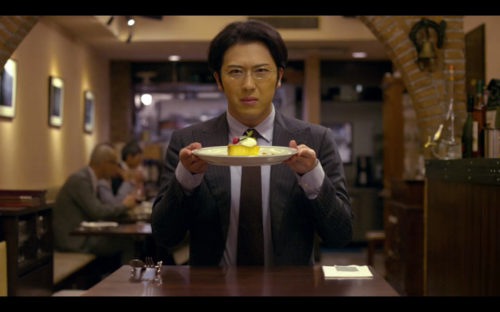Dorama review: Kantaro the Sweet Tooth Salaryman

I am in two minds whether I can really call this a dorama, as it’s barely a drama at all. This TV series (a 2017 co-production of TV Tokyo and Netflix) is in essence a travel food show, with a thin veneer of comedic storyline to tie it together. It’s very entertaining, but also very weird. And it definitely made me want to go back to Tokyo.
The lead character, Kantaro Ametani (played by Onoe Matsuya) is not an endearing man. He is the prototypical salaryman – always serious, focused, hardworking, rejecting colleagues’ invitations to socialise. But he has a secret – he plans his working day around opportunities to “bunk off” for half an hour at select dessert restaurants and then blog about them under the pseudonym Amablo. In fact, he even switched jobs (a relatively big deal in Japan, where it’s common to stick with one company for life) so that he could live and work in Tokyo, closer to all those delicious sweets.
As part of his new job is sales visits to bookshops (cue lots of scenes in Tokyo’s many many bookstores), this is relatively easy. The bulk of each episode is devoted to one particular dessert or sweet at one particular real-life shop or restaurant. The dessert is described in loving detail with high-def slow-mo photography of it being made. And the restaurant also gets an introduction that has clearly been written by its owner or PR person.
So far, so entertaining and lots of note-taking about where to go when we save our pennies for another Japan holiday. But then it gets weird.
Whenever Kantaro eats the dessert-du-jour, he contorts in fake orgasm and has a daydream of epic strangeness. Generally he meets someone whose head has been replaced by an ingredient of the dessert he is eating (e.g. a giant hazelnut) and interacts with them on one of Tokyo’s many concrete pedestrian bridges in a computer-game style fight, often ending with one or both of them being drenched in cream, chocolate or syrup. Sometimes they do a dance or have an ominous conversation instead.

There’s some simple intrigue based around whether he will get caught playing hooky, a potential love interest and a little competition over who is the best salesperson. But those are kept firmly in the background. Which is for the best as the acting isn’t great and the characters are all fairly stereotypical.
When I introduced some friends to this show, they were a little disturbed by Kantaro’s reactions when eating dessert, which for him is clearly a sensual, even sexual, experience. It can come off as creepy. But he’s a grown man and if he gets off on eating a big pile of kakigori (Japanese shaved-ice dessert) that’s his prerogative. Until, that is, the two episodes that were for me a huge mis-step.
In episode 8 (of 12 total) Kantaro babysits his boss’s son. The boy is young and extremely difficult, so Kantaro of course uses sweets to win him over. Where this gets disturbing is that all Kantaro’s dialogue about initiating the boy into the world of sweets sounds horribly like another kind of initiation. And from the facial expressions and imagery, I don’t think that’s a translation issue.
Then in the next episode, Kantaro’s mother comes to visit him and he tries to hide some eclairs from her, but ends up eating them while leering at her in an erotic fashion that would have made Oedipus proud. So wrong. I’d suggest skipping these two episodes.
So it isn’t perfect. But I must say that the bonkers daydreams and the credit sequences are the closest I have found on Netflix to the bizarreness of the TV we watched while in Japan. Most of the other doramas I’ve come across are surprisingly realistic. I have, however, spotted some Japanese horror that I imagine will not be so grounded. And there’s plenty of anime to explore. I love having access to all of this!